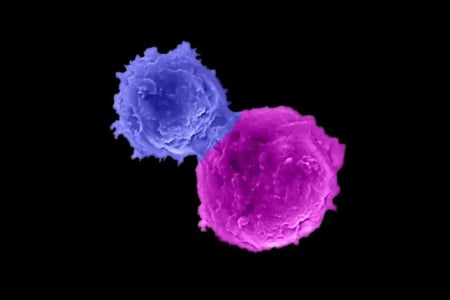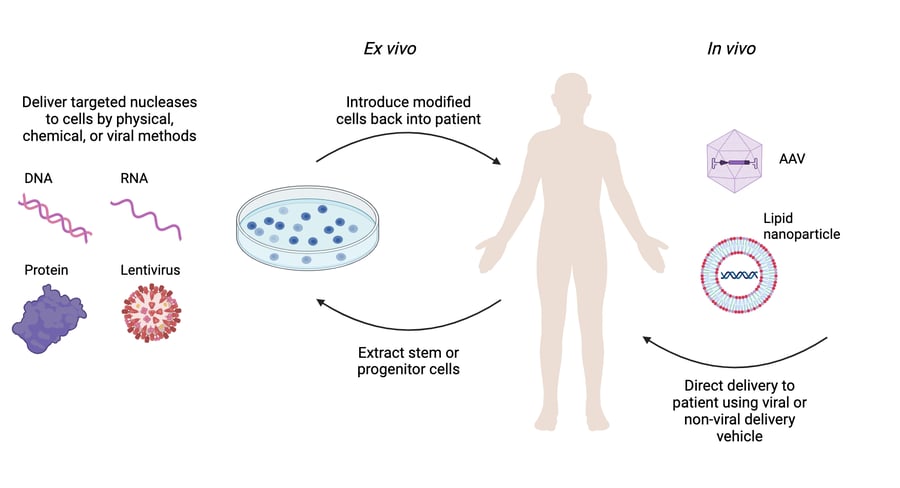Cell and Gene Therapy
The Promise of Cell and Gene Therapy Enhanced by CRISPR Technology
Cell and gene therapies have emerged as transformative approaches in modern medicine, offering the potential to treat, cure, and even prevent a wide range of diseases, from genetic disorders to cancers and beyond. These therapies work at the most fundamental level of biology, aiming to repair or replace malfunctioning cells and genes. With the advent of CRISPR technology, the field of cell and gene therapy has entered a new era, marked by increased precision, efficiency, and the potential to revolutionize healthcare.

Figure 1. Microscopy image showing an allogeneic BCMA-targeting CAR-armed and IL-15-enhanced NKT cell (BCAR-NKT cell; blue) attacking a human multiple myeloma cell (MM.1S cell; magenta). (Credit: Lili Yang lab/UCLA)
Cell and gene therapy represent two overlapping but distinct approaches to treating diseases. Cell therapy involves the transplantation of healthy cells into a patient to replace or repair damaged or diseased cells. This can include a variety of techniques, such as stem cell transplants, which are used to regenerate damaged tissues, or the infusion of immune cells designed to attack cancer.
Gene therapy, on the other hand, focuses on directly modifying or repairing faulty genes within a patient's cells. By introducing, removing, or altering genetic material, gene therapy can correct the underlying cause of genetic disorders. This approach holds particular promise for treating diseases that currently have no cure, such as certain types of inherited blindness, muscular dystrophy, and cystic fibrosis.

Figure 2. Two main methods for introducing new genetic material into cells. (Figure created with BioRender.com)
The Role of CRISPR in Cell and Gene Therapy
1. Precision in Gene Editing:
Traditional gene therapy methods have relied on viral vectors to deliver corrected genes into a patient's cells. While effective, these methods can be imprecise, sometimes leading to unintended changes in the genome, which could potentially cause side effects or other complications. CRISPR, however, offers a level of precision that was previously unattainable. By using a guide RNA to direct the CRISPR-Cas9 enzyme to a specific location in the genome, scientists can make highly targeted edits, reducing the risk of off-target effects.
2. Advancing Research and Development:
CRISPR has significantly accelerated research in the field of cell and gene therapy. In the past, developing a gene therapy could take years of research and development. With CRISPR, scientists can quickly and efficiently create models of genetic diseases, allowing them to study the effects of specific gene mutations and test potential therapies in a much shorter time frame. This has not only sped up the discovery of new therapies but has also increased the understanding of genetic diseases at a fundamental level.
3. Expanding the Scope of Treatable Diseases:
One of the most exciting aspects of CRISPR is its potential to expand the scope of diseases that can be treated with cell and gene therapy. For example, sickle cell anemia, a debilitating genetic disorder that affects millions of people worldwide, has been a major focus of CRISPR-based research. Scientists have used CRISPR to correct the genetic mutation that causes sickle cell anemia in patient-derived stem cells, which are then transplanted back into the patient to produce healthy red blood cells. This approach has shown promise in clinical trials and has been approved by the FDA as a one-time cure for the disease.
Beyond genetic disorders, CRISPR is also being explored in the treatment of cancers. CAR-T cell therapy, a type of immunotherapy, involves modifying a patient's T cells to recognize and attack cancer cells. CRISPR can enhance this process by making precise edits to the T cells' DNA, improving their ability to target and destroy cancer. This represents a significant advancement in the fight against cancer, potentially making treatments more effective and reducing the likelihood of relapse.
EditCo Expands the Toolbox for Early Phases of CGT Development

Target identification and target validation within C> development requires large-scale, high-quality assays. EditCo’s CRISPR-engineered cells and reagents allow you to perform high-throughput screens with confidence, linking specific gene disruptions to phenotypic outcomes. These products can ensure your drug discovery efforts are built on a solid foundation, facilitating the identification of targets that are both relevant and actionable. EditCo’s expertise spans multiple cell types and thousands of cell lines including iPS, immortalized, and primary cells.
Intelligent Guide Design

EditCo’s innovative approach to smart guide design allows efficient gene disruption generation, eliminating the trial and error associated with common guide design strategies. All our reagents are designed to streamline your research, ensuring more accurate and reliable results.
EditCo Solutions for Successful CRISPR-Based Target Identification
EditCo has a wide range of high-quality products to help you with your screening needs. Depending on the scale of your loss-of-function experiment, you could choose between our Arrayed gRNA Libraries or Gene Knockout Kits, both of which use our proprietary multi-guide design strategy to ensure knockouts. For those looking to identify gene mutations, our high-quality synthetic sgRNAs are a perfect solution to efficiently edit any cell type, even primary and iPS cells.

Use EditCo's Arrayed Libraries for conducting a high-throughput loss-of-function CRISPR screen. EditCo’s Arrayed CRISPR Screening Libraries combine the knockout power of bioinformatics-driven multi-guide design and high-quality synthetic sgRNA—with the added benefits of arrayed-based screening—to help you identify targets with confidence, in any human cell type including iPS and primary cells. EditCo's libraries induce functional knockouts at high-efficiency, decreasing your risk of false negatives or false positives. Our arrayed format allows for easy and reliable linkage of genotype to phenotype with little data deconvolution, ideal for high-content screening analysis. Such screens can help determine exactly how a gene knockout impacts your cell therapy’s function, in terms of metabolism, immune recognition, or more. Importantly, arrayed CRISPR screens are highly valuable for providing a defined understanding of complex phenotypes that may result in a cell as a result of a modification. From our standard pre-designed sets of 100s of genes to a genome-wide scale of 19,000+ genes to our custom library option, choosing EditCo’s Arrayed CRISPR Screening Libraries is the best choice for screening a set of potential gene targets for your cell and gene therapy studies.
EditCo Solutions for Successful CRISPR-Based Target Validation
Narrow down to your specific target gene or genetic mutation in the target validation stage using the power of CRISPR. This includes testing in multiple technical and biological replicates, as well as across multiple cell types, and performing functional analysis and rescue studies. CRISPR provides you the quickest, most precise way to evaluate potential targets. For gene knockouts, custom arrayed libraries harness the power of the arrayed high-throughput format with your specific set of targets identified from your primary screen to help you determine which targets are real and reproducible. For knock-ins or base editing, high-quality synthetic gRNA will help you validate your target(s) in any cell type. Validating your targets from screening experiments has never been easier. Researchers have used our full line of synthetic gRNA products (Arrayed CRISPR Screening Libraries and Gene Knockout Kits) to verify targets from loss-of-function primary screens.
Now that you have narrowed your focus down to a specific set of gene targets, use EditCo’s custom Arrayed CRISPR Screening Libraries to validate your targets. Our libraries combine the knockout power of bioinformatics-driven, multi-guide design with high-quality synthetic gRNA—with the added benefits of arrayed-based screening—to help you validate targets with confidence, in any human cell type including primary cells. EditCo's libraries induce functional knockouts at high-efficiency, decreasing your risk of false negatives or false positives. The arrayed format allows for easy and reliable linkage of genotype to phenotype with little data deconvolution, ideal for high-content screening analysis. Using our custom Arrayed CRISPR Screening Libraries is the fastest way to validate your set of potential gene targets more easily and safely so you can identify and validate the optimal modifications for your particular therapy.
Have more questions? Reach out to us!
